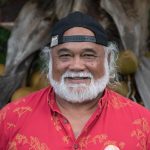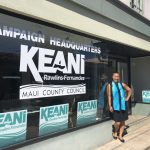Congressional candidate Kaniela Ing comes from a place called hope.
With a Sanders-inspired progressive platform, the shunning of corrupting corporate contributions and a winning smile, the idealistic 29-year old Native Hawaiian has inspired favorable comparisons to Queens’ Democrat Alexandria Ocasio-Cortez, who recently endorsed him in the hotly contested August 11 primary election that will determine who holds the open seat for Oahu’s 1st CongressiIn onal District.
As evidence of the importance of Ing’s race to the national progressive movement, Ocasio-Cortez will be traveling to Oahu to lead a rally for Kaniela Ing at 6:30 pm on Thursday, August 9, just two days before the election.
After his father’s death at the age of 11, Kaniela Ing worked his way through high school on a pineapple plantation, helping his mother, who cleaned hotel rooms, support his family and save money for college. At the University of Hawai’i, Ing was student-body president.
Soon after graduating, Ing challenged a Republican incumbent for the state House of Representatives and shocked the pundits by winning. Once in office, he was re-elected twice and rose to Majority Policy Leader, where he defied the state’s immensely powerful land development and agrochemical industries by maintaining his outspoken independence and blowing the whistle on the corrupting influence of corporate money and the selling out of the public interest by Maui’s centrist Democrats, the “old guard” of Hawai’i politics.
Ing’s promise to “defeat big-money corruption” and his championing of Medicare for All and a Green New Deal give him a good shot at winning the open congressional seat in Hawaii’s 1st Congressional District, which Bernie Sanders carried with 63% of the vote in 2016.
As Ing competes against five centrist Democrats as a pro-Sanders “Justice Democrat,” his race has attracted more than 200 volunteers. Plus the grassroots video-making-team who helped Ocasio-Coretz win assisted him in producing this powerful video:
But something happened to candidate Ing as he rose to prominence on the front line of what Bernie Sanders has called “the Second American Revolution.” Supporters want to create a government for the people instead of for corporations that fund the campaigns of candidates from both parties (including Ing’s opponents in the race, who have considerably more money than he has). In May, just a few months before the August 11 Democratic primary, the rising young star of Hawaii’s growing Sanders-supporting wing was hit by an unexpected torpedo.
Hawaii’s Campaign Spending Commission went public with a questionably-timed announcement that during the previous six years, Ing had violated the state’s intricate campaign reporting requirements 31 times by filing “false” and inaccurate reports.
The underlying fact that Ing did not steal or divert a dime of his campaign monies was lost on any voter reading the media coverage of Ing’s alleged crimes.
Also suspiciously absent from local media reports was the fact that virtually all of the campaign funds that Ing was charged with failing to properly disclose were actually disclosed – just not in a manner that would satisfy Hawai’i’s complex, regularly revised campaign finance regulations.
Ing’s enemies include many of the state’s most powerful businesses, like pesticide giant Monsanto and land development titan Alexander & Baldwin. These companies and many others are major advertisers in Hawai’i’s corporate media. The Campaign Spending violations provided an opening to tarnish the integrity of the one candidate in the Congressional race who had challenged the corrupting influence of corporate donations on the political process.
The Maui News, part of a chain of more than a hundred papers owned by the conservative West Virginia-based Ogden Newspapers corporation, jumped at the chance to spin the story. The Maui News managed to find an uncomplimentary mug shot-like image of the highly photogenic politician, which it ran above these lead paragraphs:
“The state Campaign Spending Commission has filed a complaint against South Maui state Rep. Kaniela Ing for allegedly failing to disclose more than $100,000 in campaign contributions and expenditures.
The commission filed its complaint Tuesday and lists 31 counts of campaign spending violations. The violations include filing false reports, accepting excessive contributions, and using his campaign funds for personal expenses.
Over a period of five and a half years, Ing allegedly failed to disclose $28,915.72 in contributions and $87,559.89 in expenditures — which was about 62 percent of his total expenditures.”
The article prompted outraged response in the comment section of the Maui News’ online edition, such as: “Stop him now before he plunders the state’s finances. Corruption on any level should not be tolerated.”
The problem with The Maui News coverage, as well as the coverage in the Honolulu Star Advertiser and Hawaii News Now (the state’s main TV news network) is that Ing did not “fail to disclose” $100,000 in contributions and expenditures; he simply did not label them correctly and at the right time.
As for using the campaign for personal expenses: Ing incorrectly paid his rent from his campaign account once in late 2016, then reimbursed the account within a month when he discovered the error.
“The money that went in went out,” Ing told The Maui Independent. “No money was missing.”
This assertion was supported during an interview earlier this week with Gary Kam, General Counsel of the Campaign Spending Commission, who investigated and prosecuted the complaint against Ing. “The Commissioners chose to fine him as opposed to referring it for prosecution because a fine does not require an intent,” Kam explained. As for the media smear of Kaniela Ing’s integrity, Kam observed, “You know, we don’t write the headlines.”
Running a low-cost grassroots campaign without the type of corporate donor financing that allows establishment candidates to hire professional treasurers to comply with Hawai’i’s intricate, changeable campaign finance reporting laws, Ing acted as his own treasurer and manager, and made minor errors which he corrected as soon as they were brought to his attention.
“Campaign Spending Commission rules are so complex and they change so often that a truly grassroots candidate with limited funds may not be able to keep up with the rules,” observed a leading political activist in Hawai’i.
To complicate matters more, Ing’s car was broken into outside his home during the summer of his 2016 campaign, and his phone – with images of campaign contributions – was stolen, while his political banners were shredded with a knife.
During an interview with The Maui Independent a few days ago, Alika Atay, a rising native Hawai’ian leader who was elected on a populist platform in 2016, said: “On behalf of their corporate advertisers, The Maui News takes things out of context to sway the public to misunderstanding. Since this news came out some people have jumped away from Kaniela, as if he was a pariah. I say bullshit! This is a $40 mistake, not hundreds of thousands of missing dollars.”
Ing’s integrity and his commitment to social and environmental justice have deep roots, Atay explained. “When Kaniela first announced he was running for office back in 2011, my family invited him to drink awa in the backyard. We sat on a mat and he drank awa and the elders had a chance to question him and understand his vision. He held up his cup and gave his commitment and oath to this land and our ancestors. And on that day we fully pledged to support Kaniela’s quest. We recognize his true commitment.”
If Kaniela Ing’s campaign can follow Alexandria Ocasio-Cortez’s lead and galvanize young, progressive and racially diverse voters to show up for the August 11 primary election,
an upset victory by Ing would make Hawaii the only state in the country represented in the House of Representatives by a delegation of Bernie Sanders’ political revolutionaries.
The second of the small state’s two seats in Congress is held by incumbent Tulsi Gabbard, an independent progressive who became the first woman in Congress to endorse Sanders over Clinton during the last election.
Ironically, while Hawai’i’s media has focused on Ing’s reporting errors, it has failed to mention his critique of the corrupting influence of corporate donors to campaigns. They have also failed to report on his refusal to accept donations, or highlight who is donating to his better-funded opponents.
For example, Donna Mercado Kim, a former State Senator and centrist Democrat now seen as the front-runner in the race, has raised nearly $700,000, more than double what Ing has collected. Less than 4% of this has come from small individual contributors of under $200.
Ing, by comparison, has raised more than 45% of the $312,000 he has raised to date from small contributions, ten times the percentage of Kim’s collections, and more than double that of any of his other competitors.
Many of Kim’s donations come from corporations with government contracts, including $13,500 from Alexander & Baldwin, the controversial land development and agribusiness conglomerate and public water hog descended from Hawaii’i’s first plantation owners.
Also missing from media coverage focusing on Ing’s “scandal” is the fact that he has received more than 10,000 individual donations averaging about $30 each. This is a record number of individual donations, and five times the number that any candidate for this congressional seat has ever received before.
Despite what the state’s establishment media reports, the trail of donations that corrupts Hawai’i’s politicians does not lead to the trivial technical filing errors of a Sanders’ populist who refuses all corporate donations and has sworn to act in the public interest.
Whether Hawai’i’s voters are swayed by the media’s Swift Boating of Kaniela Ing will determine whether or not, on August 11, Hawai’i becomes the leading state for people-powered democracy.
Meanwhile, Ing is staying positive, knocking on doors with a small army of grassroots volunteers. “I am very optimistic about the progressive movement we’re building,” he says. “The person who can speak with the most moral conviction could get the most votes.”





































